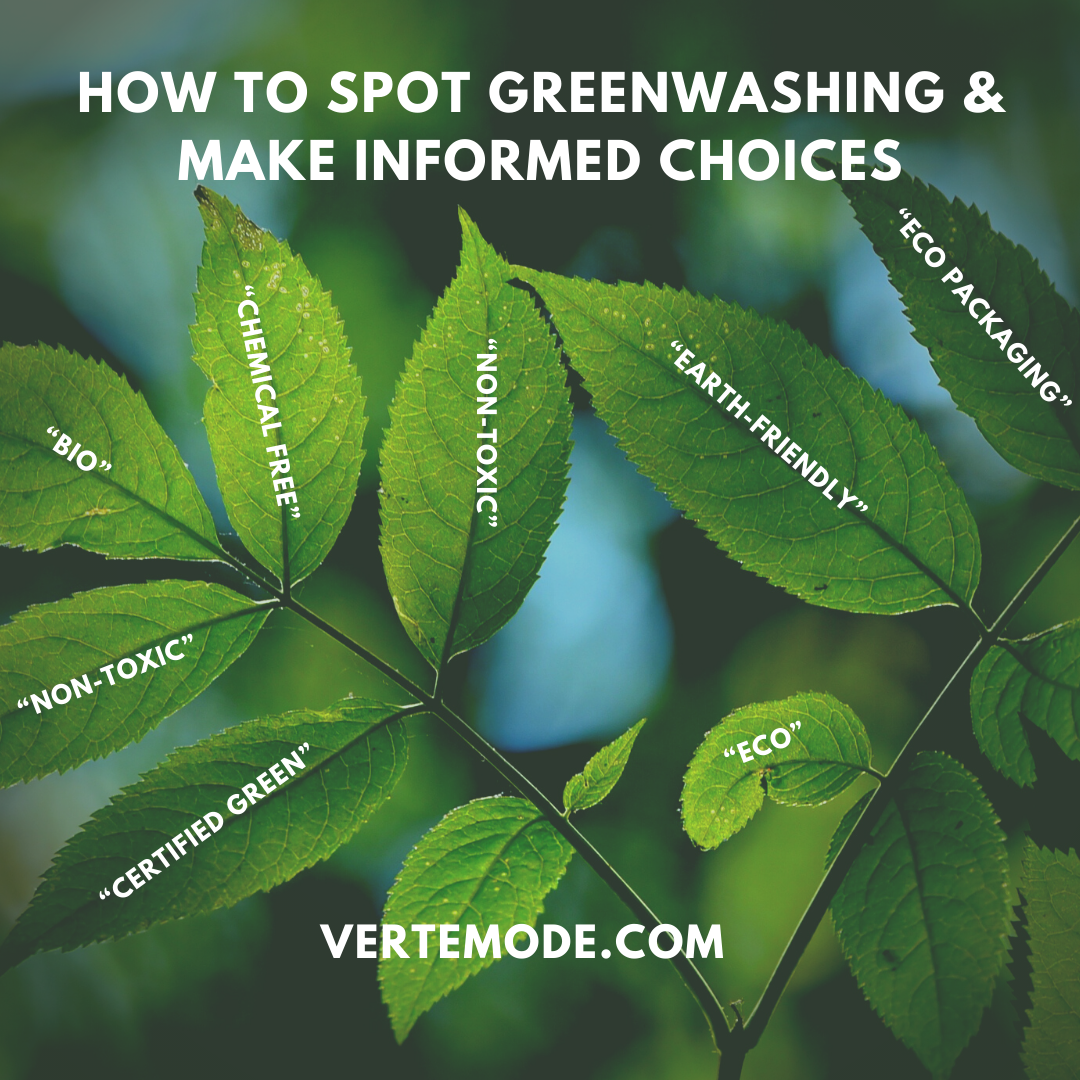We live in a time where concern for the environment is more than just a passing trend – it's a way of life. As a conscious consumer, you're likely on a mission to make eco-friendly choices, whether it's in the groceries you buy, the clothes you wear, or the products you use daily. But, hold on a second – have you ever wondered if those companies boasting about their green initiatives are truly walking the talk? Brace yourself for a revelation, because you might just be stepping into the world of "greenwashing."
Imagine this: You're in a store, looking at a product with a label that screams "sustainable," "eco-friendly," and "natural." Your heart swells with pride as you think about the positive impact your purchase will have on the planet. But here's the kicker – that product might not be as green as it claims. Welcome to the world of greenwashing, where things are not always what they seem.
Now, I know what you're thinking – "Greenwashing? Is that even a thing?" Trust me, it's more real than you might think. Let's embark on a journey to uncover the truth behind this crafty marketing tactic, learn how to spot it, and discover how you can become a savvy consumer who truly makes a difference.
What Is Greenwashing?
You're savvy, you're conscious, and you're all about supporting companies that prioritize the environment, right? But let's pause and dissect what's happening behind the scenes. Greenwashing is like a magician's trick – it's designed to make products appear far more sustainable than they actually are. It's that magical spell woven by marketers that convinces you a company is making environmentally positive choices. They use words like "natural," "wholesome," and "toxin-free" to tickle your green senses. But here's the kicker – it might all just be an illusion.
In the early days, the term "greenwashing" was coined by none other than an environmentalist named Jay Westerveld in the vibrant 1980s. Picture this: Hotels urging you to "save your towel" for the environment's sake. Sounds noble, right? Not exactly. Westerveld saw through the facade. This seemingly eco-friendly move was more about cutting the hotel's laundry expenses than saving the planet. It was a classic case of greenwashing, where the intention wasn't as pure as the pristine towels.
This leads us to the core of the issue. Companies resort to greenwashing to appeal to environmentally conscious consumers like you without making any substantial changes in their practices. They'd rather invest in painting a rosy eco-friendly picture than actually implementing meaningful changes. It's like wearing a "green" mask to the party, even if you're not the eco-champion you claim to be.
The Power of Greenwashing: Why It Works
Now, let's address the elephant in the room – why does greenwashing even exist? Well, it's simple economics. A 2015 Nielson poll revealed that a whopping two-thirds of shoppers are willing to shell out more money for products that promise to be eco-friendly. And guess what? Half of us consider a product's sustainability before adding it to our cart. This means green is not just the color of money – it's the color of conscious consumption.
But let's flip the coin. You, as a discerning consumer, are not just chasing after a trend. You genuinely care about the planet and want to support brands that align with your values. Unfortunately, this sincere desire can be exploited. Imagine this: A company throws in a few green buzzwords, adorns its packaging with leaves and trees, and voilà! You're convinced it's the eco-friendly choice. But is it really? Enter the realm of greenwashing, where appearances can be deceiving, and marketing is the wizard behind the curtain.
Unmasking the Trickery: Spotting Greenwashing
So, how do you, as a vigilant consumer, navigate this web of deception? It all starts with learning how to read between the lines, beyond the labels, and through the smokescreen of well-placed imagery. Let's unravel some tried-and-true methods to spot greenwashing.
1. Read Beyond the Labels
Words like "natural," "eco-friendly," and "sustainable" might sound like a symphony to your environmentally attuned ears. But beware – these words are like chameleons, shifting their meanings depending on the context. Think of it this way: If a company claims their toilet paper is eco-friendly because they replant trees, it's a half-truth. Sure, they're planting trees, but they're also using virgin forest fiber that's been clearcut. It's like saying you're on a diet while munching on a whole pizza. So, the next time you see those buzzwords, don't take them at face value. Look for specifics – concrete actions and deadlines that prove a company's commitment to the cause.
2. Don't Fall for Nature-Based Imagery

Close your eyes for a moment and imagine a serene forest scene with chirping birds and rustling leaves. Now imagine this scene printed on a product's packaging. Feel-good vibes, right? Well, don't let your emotions cloud your judgment. Just because a product flaunts images of nature doesn't mean it's as green as a lush meadow. Todd Larsen, the executive co-director for consumer and corporate engagement at Green America, puts it succinctly – "You may have these beautiful nature scenes, but there's not much behind it." It's like wearing a nature-themed costume without actually being one with nature.
3. Certifications: The Green Stamp of Approval
Third-party certifications can be your compass in the sea of greenwashing. These certifications, backed by consumer advocacy or environmental groups, do the legwork for you. They scrutinize a company's practices, from chemical usage to carbon emissions, and give their seal of approval to those truly walking the green path. But here's the catch – greenwashers are cunning creatures. They mimic these certifications with their own versions, watered down and less rigorous. Think of it as someone trying to photocopy a Picasso painting. So, stick with the well-regarded certifications that have a track record of integrity.
Beyond Spotting: Taking Action Against Greenwashing
Ah, knowledge is power, but it's what you do with it that truly matters. Now that you've armed yourself with the skills to spot greenwashing, let's explore how you can be an advocate for real change.
1. Look for Companies with a Cause
History speaks volumes. When a company's origin story and principles align with sustainability, you're likely looking at a genuine player in the green game. Small companies that were born with a mission to be environmentally responsible are often the unsung heroes. They're the David amidst the Goliaths, standing tall against the tide of greenwashing. When you support such companies, you're not just buying a product – you're fueling a movement.
2. Speak Up: Your Voice Matters
Greenwashing is like a sly whisper in the ears of consumers. But your voice can be a thunderous roar that drowns out the deception. Take to social media and let your followers know when you spot misleading claims. Use your power as a consumer to demand transparency and accountability from the companies trying to pull the wool over our eyes. Remember the story of Procter & Gamble and the sustainable tissue products? Hundreds of thousands of people signed a petition to the CEO, urging them to make more environmentally responsible choices. The ripple effect of such actions can lead to profound change.
But that's not all – you have an even more potent weapon at your disposal: filing a complaint directly with the Federal Trade Commission (FTC). The FTC is tasked with monitoring false or misleading marketing claims, and though their track record might not be flawless, your complaints can spark investigations that hold deceptive companies accountable. Greenwashing may have its tricks, but your determination can turn the tables.
3. Support Legislation for a Greener Tomorrow

Change starts at the policy level too. The FTC might keep an eye on deceptive marketing, but it's about time legislation caught up with the rapidly evolving landscape of environmental consciousness. Encouragingly, the FTC is already looking to update its guidelines for green marketing. This means clearer definitions and stricter guidelines for companies to follow. However, you don't have to wait for legislation to act. You can be the driving force by supporting laws that tackle deceptive marketing practices and urging your elected officials to reinforce consumer protections. After all, the onus should not be solely on consumers to sift through green lies.
4. Trust Your Gut and Stay Informed
They say knowledge is power, and that couldn't be truer when combating greenwashing. The more you know about the tactics used, the better equipped you are to spot them. Andreas Rasche, a professor at the Copenhagen Business School, encourages us to rely on common sense. If something seems too good to be true – like a one-euro T-shirt claiming to be eco-friendly – your gut feeling might just be onto something.
Moreover, staying informed and maintaining a healthy skepticism can go a long way. Research indicates that simply being aware of the prevalence of greenwashing helps you remain vigilant when making purchasing decisions. It's like having a secret weapon – you're a step ahead of those who might fall for the illusion.
Trust Worthy Products

Naturally London Organic Cleansing Enzyme Scrub
Crafted with oregano oil the Organic Cleansing Enzyme Scrub provides a gentle yet effective exfoliation, helping wash away unwanted germs all while exfoliating your hands and feet.

1 People Vegan Leather Capri Sandals In Charcoal Black
This easy-going, two strap sandle is for all our free-spirited ladies out there who love to keep comfortable while tackling a busy day. These stylish sandals are a win-win, made of recycled material which is great for the planet and easy for you to slip on.

Allégorie Poppy Red Gala Puzzle Cardholder Crafted From Apple Peel
Not a big fan of carrying purses or large wallets? We got you covered with the Allégorie compact cardholder, crafted from natural apple peel and plant-based materials. With just enough space for an ID, cash, and ATM cards, this unique cardholder is all you need for a quick errand.

Blue Heron Botanicals Vegan Lip Therapy
Everyone needs a good lip therapy product in there routine, and gosh is the Blue Heron Lip Therapy one of our favorites! This ultra-rich, organic lip conditioner is formulated to keep lips hydrated and smooth. It’s completely plastic-free and low waste which we love.
In conclusion, the world of greenwashing is more than just a buzzword – it's a reality we all need to navigate. As a conscious consumer, you hold the power to see beyond the smoke and mirrors, to recognize the tactics employed to make you believe in a greener facade. Armed with knowledge, you can now confidently decipher the vague claims, unmask the misleading imagery, and spot the true champions of sustainability.
Your role doesn't end at spotting greenwashing; it's the beginning of a journey towards a more transparent and eco-conscious marketplace. By supporting companies with genuine causes, raising your voice against deceptive practices, and advocating for stronger consumer protections, you become a force for change. Remember, while greenwashing might have its tricks, your discerning choices and actions can create a world where the green path is paved with truth and integrity.

So, the next time you stand in the aisle, faced with a product boasting its eco-friendliness, take a moment to look beyond the label, question the imagery, and rely on your instincts. With every decision you make, you're not just choosing a product – you're shaping the future of responsible consumption. And that, my friend, is the ultimate triumph over greenwashing.
At Verte Mode, we're here to revolutionize the way you approach conscious consumerism. We understand that navigating the world of eco-friendly shopping can be overwhelming, especially with the prevalence of greenwashing. That's why we've taken it upon ourselves to redefine the marketplace experience and bring you a selection of brands that you can trust wholeheartedly.
Our commitment goes beyond just offering products; it's about providing you with a seamless shopping experience that aligns with your values. Every brand that joins Verte Mode undergoes a rigorous verification process that sets us apart from the rest. We leave no stone unturned, scrutinizing every step of their supply chain – from sourcing and ingredients to shipping practices.
When you shop with us, you're not just making a purchase; you're making a statement. You're choosing transparency, sustainability, and authenticity. You're supporting brands that have demonstrated their dedication to the environment and ethical practices. With Verte Mode, there's no need to second-guess the claims – we've done the homework for you.
We understand that your choices matter, and we're here to empower you to make the right ones. By curating a collection of products that have been thoroughly vetted, we're eliminating the uncertainty that often comes with eco-friendly shopping. You can browse, explore, and shop with confidence, knowing that each item on our platform meets the highest standards of authenticity and sustainability.
Verte Mode isn't just a marketplace; it's a movement. A movement that seeks to disrupt the status quo and challenge the deceptive tactics of greenwashing. Our mission is clear: to provide you with a space where you can make informed choices and support companies that are genuinely committed to a greener, more ethical future.
Join us in this journey towards a better world. Choose Verte Mode, and together, let's redefine the way we shop, one conscious decision at a time.














